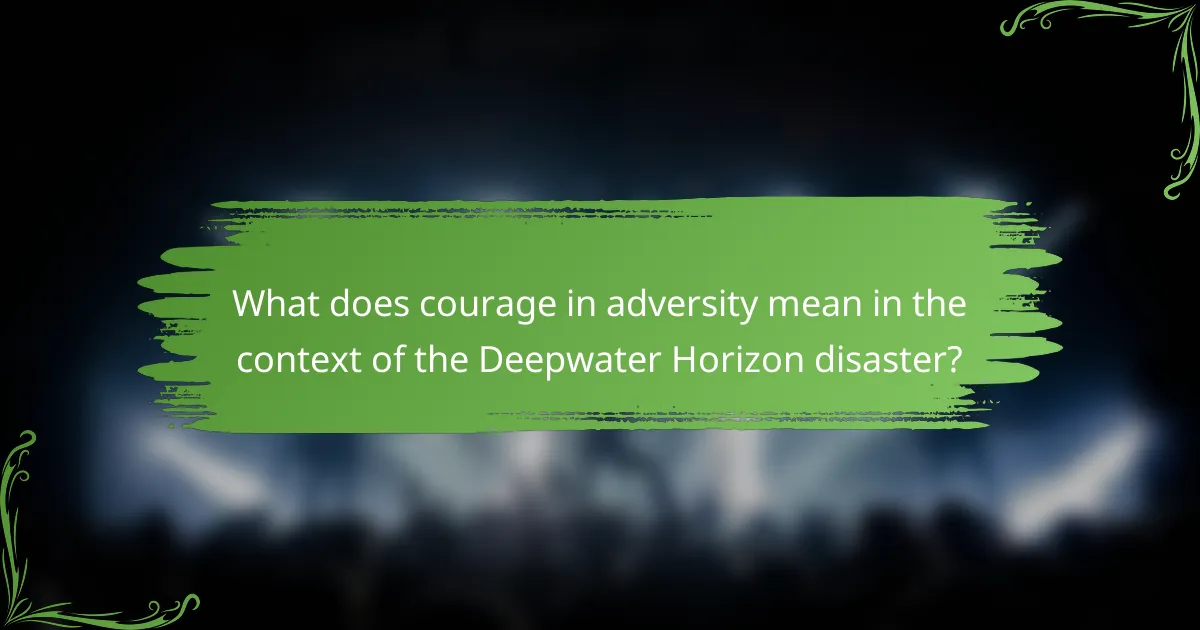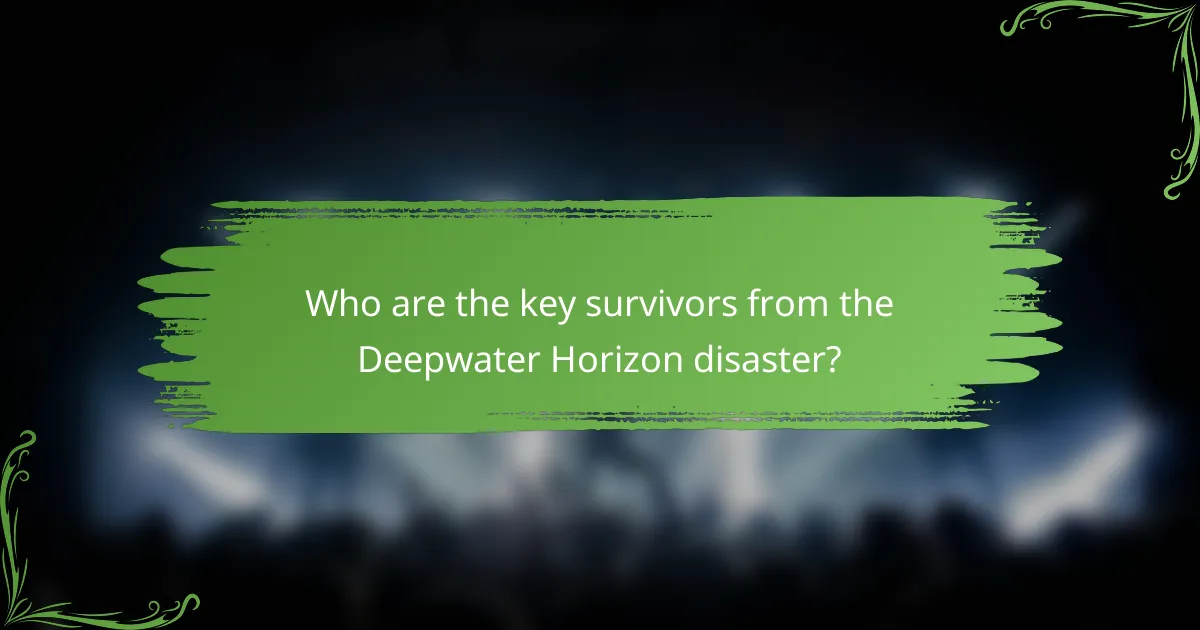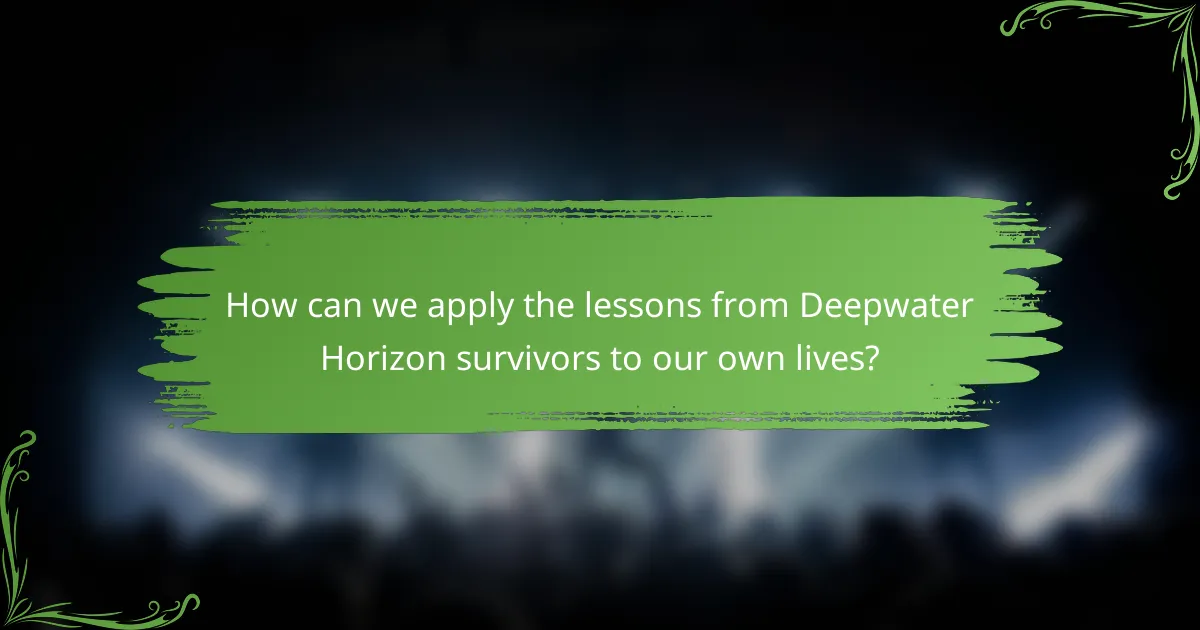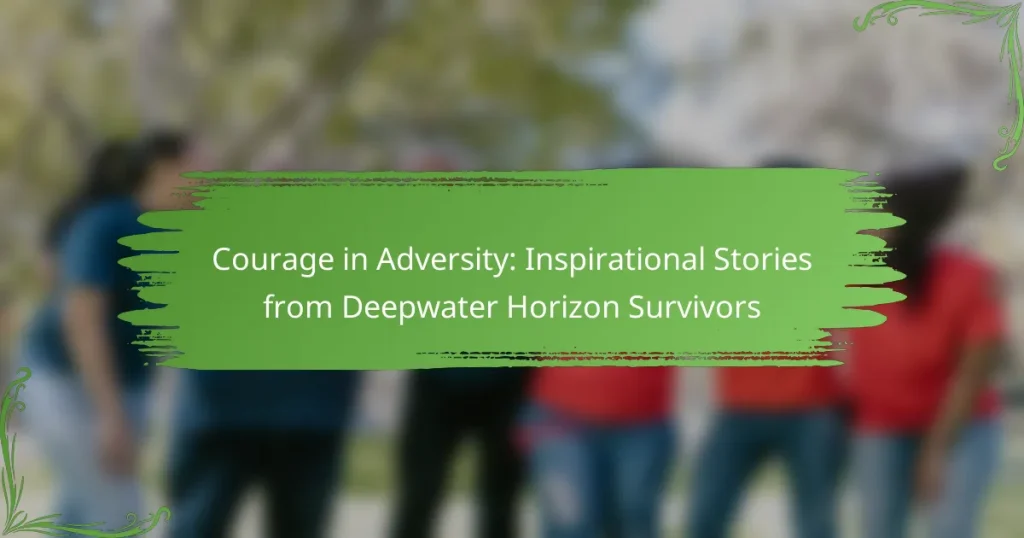The article focuses on the concept of courage in adversity, specifically through the lens of the Deepwater Horizon disaster. It highlights the actions of key survivors, including Mike Williams, Andrea Fleytas, and Jason Anderson, who displayed remarkable bravery and resilience during life-threatening conditions. Their quick decision-making and teamwork were instrumental in saving lives and managing the crisis. The article also emphasizes the lessons learned from these experiences, advocating for resilience, collaboration, and preparedness in facing personal challenges.

What does courage in adversity mean in the context of the Deepwater Horizon disaster?
Courage in adversity during the Deepwater Horizon disaster refers to the ability of individuals to confront extreme danger and uncertainty. This was exemplified by the actions of workers on the rig who faced life-threatening conditions. Many chose to remain calm and assist others despite the chaos. Their quick decision-making and selflessness helped save lives. For instance, some crew members initiated emergency procedures to evacuate their colleagues. This demonstrated resilience in the face of overwhelming challenges. Such acts of bravery highlighted the human spirit’s capacity to endure and respond positively in crises.
How did the Deepwater Horizon incident challenge the survivors’ courage?
The Deepwater Horizon incident significantly challenged the survivors’ courage through life-threatening situations. Survivors faced intense fear during the explosion and subsequent fire. Many had to make quick decisions under extreme pressure. They demonstrated bravery by assisting others in evacuating the rig. The chaotic environment tested their mental and physical resilience. The aftermath involved grappling with trauma and loss. Many survivors dealt with long-term psychological effects. Their stories highlight the profound impact of facing such adversity.
What specific adversities did the survivors face during and after the incident?
Survivors of the Deepwater Horizon incident faced numerous adversities during and after the event. During the explosion, they experienced intense fear, physical injuries, and smoke inhalation. Many were trapped in the rig, dealing with chaos and uncertainty. After the incident, survivors confronted emotional trauma, including PTSD and survivor’s guilt. They also faced health issues due to exposure to toxic substances. Additionally, some survivors struggled with job loss and financial instability. The long-term impact included difficulties in reintegrating into normal life and coping with the memories of the disaster. These adversities highlight the profound challenges faced by those who survived the tragedy.
How did these challenges test their resilience?
The challenges faced by the Deepwater Horizon survivors tested their resilience by forcing them to confront life-threatening situations. They experienced extreme stress and uncertainty during the oil spill crisis. The need to make quick decisions under pressure highlighted their mental fortitude. Survivors had to rely on teamwork and communication to navigate hazardous conditions. Many displayed adaptability in the face of rapidly changing circumstances. Emotional and physical exhaustion tested their limits continuously. The aftermath required them to cope with ongoing psychological impacts. Their ability to recover and support one another demonstrated their resilience.
What role does storytelling play in understanding courage in adversity?
Storytelling plays a crucial role in understanding courage in adversity. It humanizes experiences and allows individuals to connect emotionally with the narratives. Through storytelling, complex emotions and situations are simplified, making them relatable. Stories of Deepwater Horizon survivors illustrate resilience in the face of danger. These narratives highlight personal struggles and triumphs, showcasing acts of bravery. Research shows that stories can inspire others to confront their own challenges. They serve as powerful tools for empathy and learning. Storytelling fosters a sense of community among those who face adversity.
How can personal narratives inspire others facing similar challenges?
Personal narratives can inspire others facing similar challenges by providing relatable experiences and fostering hope. These stories often highlight resilience in the face of adversity. For example, Deepwater Horizon survivors share their journeys of recovery and determination. Their accounts can resonate with individuals undergoing similar struggles. Research indicates that storytelling can enhance empathy and understanding. Narratives create a sense of community among those affected. They demonstrate that overcoming obstacles is possible. This can motivate others to take action in their own lives. Personal narratives serve as powerful reminders of human strength and perseverance.
What are the psychological benefits of sharing these stories?
Sharing stories provides several psychological benefits. It fosters a sense of connection among individuals. This connection can reduce feelings of isolation and loneliness. Sharing experiences promotes emotional healing and processing of trauma. It allows individuals to reflect on their experiences and gain insights. This reflection can lead to increased resilience and coping strategies. Additionally, storytelling can enhance empathy in both the storyteller and the audience. Engaging with others’ narratives can create a supportive community. Research indicates that storytelling can also improve mental well-being by facilitating catharsis.

Who are the key survivors from the Deepwater Horizon disaster?
Key survivors from the Deepwater Horizon disaster include Mike Williams, the chief electronics technician. He played a crucial role in the evacuation. Another survivor is Andrea Fleytas, a dynamic positioning officer. She helped guide the crew during the crisis. Additionally, Jason Anderson, a toolpusher, survived and later shared his experiences. These individuals faced extreme danger but managed to escape. Their stories highlight the courage and resilience of those on board.
What are the backgrounds of notable survivors?
Notable survivors of the Deepwater Horizon disaster include individuals from various professional backgrounds. Many were experienced oil rig workers, trained in safety protocols. Others were engineers and technicians responsible for equipment maintenance. Some survivors were environmental scientists concerned about the ecological impact. Their diverse experiences contributed to their resilience during the crisis. For example, Mike Williams, the rig’s chief electronics technician, played a critical role in the evacuation. His quick thinking and technical knowledge saved lives. Another notable survivor, Andrea Fleytas, was a dynamic positioning officer who demonstrated exceptional leadership. These backgrounds highlight the importance of training and expertise in emergency situations.
How did their previous experiences shape their responses to the disaster?
Previous experiences significantly influenced the responses of Deepwater Horizon survivors to the disaster. Many survivors had prior experiences in high-pressure situations, which equipped them with crisis management skills. For instance, individuals with backgrounds in emergency response acted quickly to assess dangers. Their training helped them prioritize safety and coordinate evacuation efforts effectively. Additionally, those who had faced previous workplace hazards demonstrated resilience and adaptability. This familiarity with risk management allowed them to remain calm under pressure. As a result, their responses were characterized by quick decision-making and effective teamwork. This collective experience ultimately contributed to saving lives during the crisis.
What unique attributes do these survivors possess that contributed to their courage?
These survivors possess resilience, adaptability, and a strong sense of community. Resilience allows them to bounce back from traumatic experiences. Adaptability helps them navigate unpredictable challenges effectively. Their strong sense of community fosters support and collaboration among peers. This collective strength enhances their courage in facing adversity. Research on trauma recovery highlights these attributes as critical for overcoming challenges. Studies indicate that social support significantly boosts resilience in crisis situations.
What are some specific stories of courage from these survivors?
Survivors of the Deepwater Horizon disaster exhibited remarkable courage in the face of life-threatening situations. One survivor, Mike Williams, demonstrated bravery by staying on the rig to help others evacuate despite the chaos. He made multiple trips back into the burning rig to rescue crew members. Another survivor, Andrea Fleytas, displayed immense courage when she took charge of the evacuation process. She ensured that everyone was accounted for and guided them to safety. Additionally, Jason Anderson, a crew member, risked his life to assist injured colleagues, showcasing selflessness under pressure. These stories highlight the extraordinary acts of bravery that emerged during a catastrophic event.
How did individual actions during the crisis demonstrate bravery?
Individual actions during the Deepwater Horizon crisis demonstrated bravery through selfless acts of rescue and support. Survivors reported instances where crew members risked their lives to save others. For example, some individuals evacuated others from dangerous areas despite personal risk. Others provided first aid to injured colleagues, prioritizing their safety over their own. These actions exemplified courage in the face of life-threatening circumstances. The commitment to help others, even when facing potential harm, highlights the essence of bravery. Such acts were crucial in mitigating the crisis’s impact and saving lives.
What long-term impacts did these experiences have on their lives?
The long-term impacts of the Deepwater Horizon disaster on survivors’ lives include psychological trauma and resilience development. Many survivors experienced post-traumatic stress disorder (PTSD) symptoms, affecting their mental health for years. Research indicates that 30% of individuals exposed to such disasters develop lasting psychological issues. Additionally, survivors reported increased resilience and a stronger sense of community. They often engaged in advocacy work, raising awareness about safety and environmental issues. This shift in focus helped many find purpose in their experiences. The disaster also led to changes in career paths for some, as they sought roles in environmental protection and safety advocacy. Overall, the experiences shaped their identities and influenced their future decisions significantly.

How can we apply the lessons from Deepwater Horizon survivors to our own lives?
We can apply the lessons from Deepwater Horizon survivors by embracing resilience and teamwork in our own lives. Survivors demonstrated the importance of staying calm under pressure. They relied on each other for support during a crisis. This highlights the value of community and collaboration in facing challenges. Additionally, the survivors’ ability to adapt to rapidly changing situations teaches us to be flexible. Their experiences remind us to prioritize safety and preparedness in our daily routines. By learning from their courage, we can better navigate our own adversities.
What practical strategies can we learn from their stories?
Survivors of the Deepwater Horizon disaster demonstrate resilience and teamwork as key strategies. They emphasize the importance of communication during crises. Effective communication can prevent misunderstandings and enhance safety. Additionally, they highlight the need for thorough training and preparedness. Proper training equips individuals to handle unexpected situations. Adaptability is another crucial strategy they showcase. Being open to change can lead to better problem-solving. Lastly, maintaining a positive mindset fosters perseverance in adversity. These strategies collectively contribute to overcoming challenges in high-stress environments.
How can we cultivate resilience in our own lives?
To cultivate resilience in our lives, we can practice self-care and mindfulness. Engaging in regular physical activity boosts mental health and reduces stress. Maintaining strong social connections provides support during challenging times. Setting realistic goals helps focus efforts and fosters a sense of accomplishment. Developing problem-solving skills enhances our ability to cope with adversity. Embracing change allows us to adapt and grow from experiences. Research shows that resilience can be built through consistent practice and support systems. A study by Tugade and Fredrickson (2004) found that resilient individuals experience less negative emotion and recover more quickly from stress.
What steps can we take to support others in adversity?
We can support others in adversity by actively listening to their concerns. Listening helps individuals feel valued and understood. Offering emotional support is also crucial. This can include expressing empathy and validating their feelings. Providing practical assistance can make a significant difference. This might involve helping with daily tasks or connecting them to resources. Encouraging open communication fosters a supportive environment. Regular check-ins can show that you care and are available. Sharing personal stories of overcoming challenges can inspire resilience. These steps create a network of support that can alleviate feelings of isolation during tough times.
Why is it important to remember and share these stories?
Remembering and sharing these stories is crucial for preserving collective memory. These narratives highlight human resilience in the face of adversity. They serve as powerful reminders of the challenges faced during the Deepwater Horizon disaster. Sharing these experiences fosters empathy and understanding among communities. It can inspire future generations to act courageously in difficult situations. Documented accounts can also influence policy changes to enhance safety in similar industries. Research shows that storytelling can enhance emotional connection and facilitate learning. Therefore, these stories have lasting significance beyond their immediate context.
How can sharing these narratives contribute to a culture of courage?
Sharing narratives from Deepwater Horizon survivors fosters a culture of courage by providing relatable examples of resilience. These stories highlight individuals facing extreme adversity and making brave choices. When shared, they inspire others to confront their own challenges. Research shows that storytelling can enhance empathy and motivate action. For instance, a study by the University of Pennsylvania found that personal narratives significantly increase the likelihood of individuals taking courageous actions themselves. By illustrating real-life experiences, these narratives reinforce the notion that courage is attainable. They create a supportive community where individuals feel empowered to act bravely in their own lives.
What impact does remembering these stories have on future generations?
Remembering the stories of Deepwater Horizon survivors instills resilience and courage in future generations. These narratives serve as powerful lessons about overcoming adversity. They provide insights into human strength in the face of crisis. By sharing these experiences, future generations learn the importance of teamwork and perseverance. Historical events like the Deepwater Horizon disaster highlight the need for environmental responsibility. The stories also foster empathy and understanding of the challenges faced by others. This collective memory can inspire proactive behavior in similar situations. Ultimately, these stories shape a culture of resilience and awareness in future leaders.
What are some resources for further exploring courage in adversity?
Books such as “Deepwater Horizon: A Catastrophe for the Ages” by John J. Bruno provide insights into courage during crises. Documentaries like “The Deepwater Horizon Disaster” highlight personal stories of resilience. Online articles from reputable sources like National Geographic discuss the human spirit in tough situations. Additionally, TED Talks on overcoming adversity offer motivational perspectives. These resources collectively explore the theme of courage in the face of adversity, particularly in the context of the Deepwater Horizon incident.
The main entity of this article is ‘Courage in Adversity’, specifically illustrated through the inspirational stories of survivors from the Deepwater Horizon disaster. The article examines the actions and resilience of individuals who faced extreme danger during the crisis, highlighting their bravery in life-threatening situations and the long-term psychological impacts they experienced. It also explores the role of storytelling in understanding and sharing these experiences, emphasizing how personal narratives can inspire others and foster a culture of courage. Key survivors are identified, and their unique attributes and responses to adversity are discussed, along with practical strategies for cultivating resilience and supporting others in challenging times.


